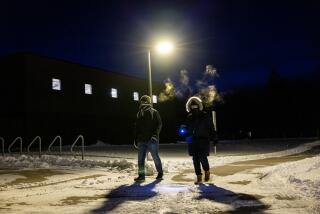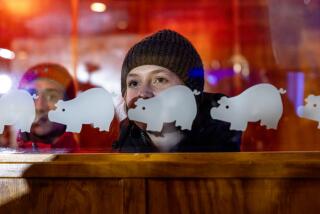Foreign reporters try to explain race
Veteran political writers Don Frederick and Andrew Malcolm offer irreverent takes on the 2008 campaign.
•
Americans weren’t the only ones surprised by Illinois Sen. Barack Obama’s decisive victory in Iowa’s Democratic caucuses on Thursday.
Like hundreds of foreign journalists trying to make sense of an unsettled time in American political life, Nuala O’Faolain, who is covering the campaign for Dublin’s Sunday Tribune, was still trying Monday to absorb it. She was especially baffled by Hillary Rodham Clinton’s third-place finish.
“It’s very difficult for a Clinton to do wrong in Ireland,” she said. “There is a golf course in Kerry where Bill Clinton once played, and do you know that there is a statue of him there? Teenage girls gather around it . . . and they’re called Monicas.”
With that she scooted back onto the luxury bus waiting to take her back to the Courtyard Marriott in Manchester, the de facto headquarters for the foreign press corps.
It’s anybody’s guess how many American journalists are here covering the nation’s first primary of 2008. But the State Department can pretty much tell you exactly how many foreigners are here -- 238 journalists from 181 organizations in 44 countries. That is because the government requires a particular visa for such workers, and offers them lots of support.
On Monday, foreign journalists could begin their day with a 9 a.m. briefing by University of New Hampshire polling director Andrew E. Smith. Next, they could choose from a couple of daytime and evening itineraries, which seemed more heavily weighted toward Republicans than Democrats.
“The reason the State Department is here is to promote democracy,” said Babs Chase, the political and congressional liaison for the government’s Foreign Press Center.
Despite her long title, Chase is the den mother of this motley group, ferrying them to events, arranging briefings by public officials who help explain the sometimes confusing process of how an American president gets elected.
Many of the international press, such as Reymer Kluever of Sueddeutsche Zeitung (Germany’s biggest political daily newspaper), are U.S.-based foreign correspondents who live in Washington, D.C. or New York City. Others, like Thailand’s Thepchai Yong of the Nation Group, a multimedia company, have come specifically to cover this story.
Most said they had assumed that New York Sen. Clinton, who had visited their countries as first lady, would have no problem winning the Democratic nomination. And most seemed more interested in Democrats than Republicans.
“There have been polls in Germany showing that 80% would vote for a Democrat and only 20% would vote for a Republican,” said Kluever, 47. Just this morning, he said, he filed a story on “Obamamania.” (Apparently, it’s the same word in German.)
“It’s a circus,” said Harald Klungtveit, a 25-year-old reporter from Oslo. “Iowa was kind of crazy, but then I came here. . . . Wow.”
Hyung Du Choi has been Washington bureau chief of Seoul’s daily newspaper Munhwa Ilbo for two years. Sitting at a table in the lobby of the Courtyard Marriott, which has been turned into a multilingual newsroom, he said he had been reading American news websites closely and was not surprised when Obama won.
Still, given the time zone differences, he had to go to press before the Iowa caucus results were official, forcing him to finesse his story. The big headline on his story, he said, was “Change.”
Though the Iowa caucuses are lively and idiosyncratic, foreign reporters have seen more boisterous displays on behalf of candidates in New Hampshire cities. Before a John McCain rally on the statehouse plaza in Concord, competing groups of supporters tried to shout each other down.
Even the yard signs here are louder. Though Iowa lawns were dotted with tasteful little posters for candidates, here snowbanks are crowded with huge signs that look like small billboards. “What impresses me the most is the level of enthusiasm,” said Yong, who is working on a two-part documentary that will air in Thailand next week.
Like other members of the foreign press, he hasn’t interviewed any of the candidates, who are using their one-on-one encounters with American reporters to strategic advantage. The State Department’s Chase said she took a group of foreign journalists to the Jefferson-Jackson Dinner in Des Moines in November.
One reporter, Leonard Doyle of London’s Independent, happened to be close enough to Obama as he finished his speech to ask for an interview.
“I’ve got the Des Moines Register and the Independent,” Chase recounted Obama saying. “How many of your folks vote here?”
More to Read
The biggest entertainment stories
Get our big stories about Hollywood, film, television, music, arts, culture and more right in your inbox as soon as they publish.
You may occasionally receive promotional content from the Los Angeles Times.







